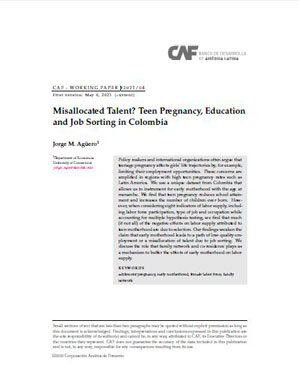| dc.contributor.author | Berniell, Inés | |
| dc.contributor.author | Berniell, Lucila | |
| dc.contributor.author | de la Mata, Dolores | |
| dc.contributor.author | Edo, María | |
| dc.contributor.author | Fawaz, Yarine | |
| dc.contributor.author | Machado, Matilde P. | |
| dc.contributor.author | Marchionni, Mariana | |
| dc.coverage.spatial | América Latina y el Caribe | es_ES |
| dc.date.accessioned | 2021-12-29T19:09:43Z | |
| dc.date.available | 2021-12-29T19:09:43Z | |
| dc.date.issued | 2021-12-29 | |
| dc.identifier.citation | Berniell, I., Berniell, L., de la Mata, D., Edo, M., Fawaz, Y., Machado, M. P., & Marchionni, M. (2021, December 29). Motherhood and the Allocation of Talent. Caracas: CAF. Retrieved from https://scioteca.caf.com/handle/123456789/1861 | en_GB |
| dc.identifier.uri | https://scioteca.caf.com/handle/123456789/1861 | |
| dc.description.tableofcontents | In this paper we show that motherhood triggers changes in the allocation of talent in the labor market beyond the well-known effects on gender gaps in employment and earnings. We use an event study approach with retrospective data for 29 countries drawn from SHARE to assess the labor market responses to motherhood across “talent” groups, i.e. groups with different educational attainment, relative performance in math by the age of 10, and personality traits. We find that while even the most talented women—both in absolute terms and relative to their husbands—leave the labor market or uptake part-time jobs after the birth of the first child, all men, including the least talented,
stay employed. We also find that motherhood induces a negative selection of talents into self-employment. Although these results are observed in all 29 countries, there is some heterogeneity in the magnitude of the motherhood effects. We find larger motherhood effects in countries with more conservative social norms and, to a less extent, with weaker policies regarding worklife balance. Overall, our results suggest relevant changes in the allocation of talent caused by gender differences in nonmarket responsibilities that can have sizable impacts on aggregate market productivity. | es_ES |
| dc.language.iso | en | es_ES |
| dc.publisher | CAF | es_ES |
| dc.subject | Economía | es_ES |
| dc.subject | Familia | es_ES |
| dc.subject | Investigación socioeconómica | es_ES |
| dc.subject | Mujer | es_ES |
| dc.subject | Niñez | es_ES |
| dc.title | Motherhood and the Allocation of Talent | es_ES |
| dc.type | workingPaper | es_ES |
| dc.publisher.city | Caracas | es_ES |


